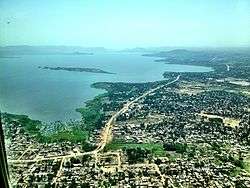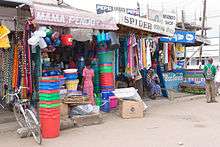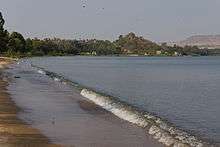Musoma
| Musoma, Mara | |
|---|---|
 | |
 Musoma, Mara Location in Tanzania | |
| Coordinates: 01°30′00″S 33°48′00″E / 1.50000°S 33.80000°E | |
| Country |
|
| Region | Mara Region |
| District | Musoma Urban District |
| Elevation | 3,900 ft (1,200 m) |
| Population (2012 Census) | |
| • Total | 134,327 |
| Time zone | East Africa Time (UTC+3) |
Musoma is a city in Tanzania. It is the capital of Mara Region, one of the administrative Regions of Tanzania. It also serves as the administrative centre of Musoma Rural District and Musoma Urban District.
Location
The city sits on the eastern edge of Lake Victoria, close to the International borders of Tanzania with Kenya and Uganda. Musoma is located approximately 60 kilometres (37 mi), directly south of the geographical point where the borders of the three East African countries intersect. The town is located approximately 225 kilometres (140 mi), by road, northeast of Mwanza, the nearest large city.[1] Musoma lies approximately 480 kilometres (300 mi), by road, northwest of Arusha, the location of the headquarters of the East African Community.[2] The coordinates of Musoma are:1° 30' 0.00"S, 33° 48' 0.00"E (Latitude:-1.5000; Longitude:33.8000).
History and Etymology

The name Musoma comes from the word Omusoma which means, a spit. The name refers to Musoma's many spits pointing into the surrounding Lake Victoria.
Among the current resident ethnic groups of Mara, the site that later developed into the town of Musoma was first settled by the Kurya subtribe of Abhakabhwa, commonly called Wakabwa. They also gave the name to the location. Hence, Musoma originates from the Kabwa word 'Omusoma', which actually means a piece of land that protrudes into the Lake, essentially, a peninsula. All the kingdoms in Mara, which are actually sub-kingdoms of people with a common ancestry use the word 'Omusoma' (for the Wakabwa, as well as the Wajita and the closely related sub tribes of Wakwaya, Waruri, Wakara, and Wakerewe) and 'Omosoma' (for the many Kurianic sub-tribes such as Abhakerobha - commonly called Wakiroba; Wasimbiti, Wakenye, nk.). The full name is actually "Omosoma (or 'Omusoma') ghwa Nyabhamba".
Musoma was hotly contested and witnessed many intra-ethnic wars, particularly between the Wakabwa and their kins, the Wakiroba - who were second to arrive in the location after the Wakabwa. The Wakabwa brought in their allies, the non-Bantu Luo and were on the tip of winning the war. The Wakiroba turned to their allies, the Wakwaya but were still heading for defeat. Seeing the situation worsen, the Wakwaya and Wakiroba sought support from the Germans, who at that time had arrived in Mwanza but not yet conquered present day Mara. It was under severe attacks by the German Canons that the Wakabwa and their allies the Luo could be defeated and chased away from the area. A legacy of this war are several mass graves just outside Musoma, particularly in Nyabhange (now commonly called Nyabangi) in Kiroba Land. From that time on, the Wakiroba and Wakwaya became resident neighbors of Musoma, dominating its population for a very long time. Now Musoma is significantly cosmopolitan.
The first headquarters of the occupying Germans was established in Nyabangi, but - just like in the case of Bagamoyo on the Indian Ocean Coast, which was the first Capital of 'German East Africa' - it was abandoned due to shallow waters that made an unsuitable location for a harbour. Musoma became the new capital. Today, the old German 'Boma' is testimony to this history of Musoma.
Geography

The town is situated in a heavily indented bay. The Mara River, after which the administrative region of Mara Region is named, flows into Lake Victoria, in nearby Kirumi in Kiroba/Simbiti Land.
Notable persons from Musoma and Mara
Musoma has produced many famous Tanzanians. Mwalimu Julius Kambarage Nyerere, the father of the nation and de facto leader of its people from 1954 when he became Chairman of Tanganyika African National Union (TANU), attended Mwisenge Primary School in Musoma. So did Justice Joseph Sinde Warioba, the country's former Prime Minister and Vice President. In fact the student list of Mwisenge reads like a 'who is who' in Tanzania's first Republic: Joseph Warioba Butiku, Col. Selemani Kitundu, Moses Mang'ombe, and others.Other senior politicians from Mara include late Bhoke Munanka, Stephen Wassira, late Abel Mwanga, Makongoro Nyerere, Nimrod Mkono, Dr.Steven Kebwe, Shyrose Bhanji and Gaudencia Kabaka.
Mara has also produced many top rank military leaders of the country, including three Chiefs of Defence Forces: Generals David Musuguri, Late Ernest Kyaro, and George Waitara. Other generals from Mara include Late Maj. General Mwita Marwa, Brg. Gen Christopher Gimonge, and Lt. Gen Sylvester Ryoba, Late Col. Dr M M Nsimba and Lt. Col. Dr. Josiah Mekere.
A list of retired Ambassadors who hail from Mara include late James Ndobho, Nimrod Lugoe and Charles Nyirabu (late) and Ambassador Joshua Opanga. Also on the list of notable retired Ambassadors to hail from Mara Region are the former lecturer at the University of Dar es Salaam, Ambassador Dr. Marwa Mwita Matiko (now Advocate of the High Court of Tanzania), Ambassador Mrs Nyasugara Kadege, Ambassador Dr. James Nzagi and Ambassador Professor Joram Mukama Biswaro who is now AU Chairperson's Representative in South Sudan.
Mara has also produced several top notch academics. The list of senior academicians from Mara include: Prof Dominic Kamabarage the Vice Chancelor for Mwalimu Julius Nyerere University of Agriculture and Technology, Prof Majura Selekwa who heads the Mechatronics and Robotics Laboratories at North Dakota State University in USA, Transportation Engineering Professor Deo Chimba of Tennessee State University in USA, Professor Thobias Sando of University of North Florida, Economics professor Samuel Mwita Wangwe, Professor Lloyd M. Binagi, Professor Kohi, Professor Bwatondi, Professor Mohabe Nyirabu and the late Professor Paul Masyenene Biswalo, Professor Sarungi, Professor Daudi Mukangara, Professor Julius Nyang'oro and Professor Sospeter Muhongo, Tanzania's first professor of Geology. Prof. Muhongo is now a minister, Dr Nyankomo Wambura Marwa a Senior Lecturer and Development Finance scholar at the University of Stellenbosch Business School in South Africa and Herbert Smith Center for Technology Management and Entrepreneurship at the University of New Brunswick Canada. Francis Shasha Matambalya, Tanzania's first indigenous professor of international trade was also born in Musoma. He is a scholar of international repute in his area of specialization. Professor Ibrahim Juma, a judge with Tanzania's Court of Appeal also hails from Musoma. Mara has also produced several chemists such as Abdallah A. Kalimbika, Emmanuel Marwa, Peter Musiba, Magori Nyangi and Robert Christopher. Also Geologist Christopher Mkono hail from Mara
Other important people to hail from Mara are Alphayo Kidata, Head of TRA, Dr Samwel Nyantahe of CTI, Dr.Ayub Ryoba of TBC and Esther Matiko the Tarime Urban MP.
Mara has also produced several top-notch athletes: Footballer Mohammed Bakari Tall (Simba and National Team), footballer Mbwana Samata (Simba, TP Mazembe, and National Team; winner of the African Footbal Champions League with TP Mazembe), footballer Amir Kiemba (Simba and National Team, footballer Ally Mchumira (The Young Africans 'Yanga' and National Team), the Isangura Brothers (boxing, Olympians, and Commonwealth Games Medal Winners), the late Bhoke Matambalya (Jeshi Stars and national teams, ladies basketball and netball), the late Feada Faru (Jeshi Stars and national teams, ladies basketball and netball)and Late Sulusi (National athletics), Late Samuel Mahesa (JKT & Jeshi Stars Basketball and National Team).
Mara has also produced several successful business people in Tanzania and East Africa. Probably the most popular of them is industrialist Mwita Gachuma, who possesses several factories in Mwanza. He is also a hotelier. Others include Mr. Vedastus Manyinyi Mathayo who is also a businessman of remarkable stature, numbering among the few local billionaires in Tanzania who hail from Mara.Also there are emerging international social entrepreneurs like Dr Nyankomo Wambura Marwa under his Canadian flagship company of Matumaini Capital Inc.
Source: Masimulizi ya Historia ya Watu wa Mara. Mara Elders Meetings.
Climate
| Climate data for Musoma | |||||||||||||
|---|---|---|---|---|---|---|---|---|---|---|---|---|---|
| Month | Jan | Feb | Mar | Apr | May | Jun | Jul | Aug | Sep | Oct | Nov | Dec | Year |
| Average high °C (°F) | 28 (82) |
28 (83) |
28 (83) |
28 (82) |
28 (82) |
27 (81) |
28 (82) |
28 (82) |
28 (83) |
29 (84) |
28 (83) |
28 (82) |
28 (82) |
| Average low °C (°F) | 19 (66) |
19 (66) |
20 (68) |
19 (66) |
18 (65) |
18 (64) |
17 (63) |
18 (64) |
20 (68) |
19 (66) |
19 (66) |
19 (66) |
19 (66) |
| Average precipitation mm (inches) | 56 (2.2) |
58 (2.3) |
114 (4.5) |
173 (6.8) |
107 (4.2) |
30 (1) |
20 (0.8) |
20 (0.8) |
30 (1) |
36 (1.4) |
69 (2.7) |
66 (2.6) |
765 (30.1) |
| Source: Weatherbase[3] | |||||||||||||
Population
The 2002 national census put the population of Musoma at 104,851.[4] The 2012 Census showed a population of 134,327.[5]
People
Tanzania's founding leader, President Julius Kambarage Nyerere and Tanzania's former Prime Minister, Joseph Sinde Warioba, both attended Mwisenge Middle School in Musoma. The politician and ambassador Paul Bomani was born in Musoma in 1925.[6]
Musoma is home to the Wakiroba subtribe of the Kuria, and to the Kwaya subtribe that is closely related with Wajita, Waruri, Wasimbiti and Wakara. It is also home to the Wajita, Waruri,Wakara, all Kuria sub tribes (including the Wazanaki and Waikizu), and the Luo, among others. Over time, several ethnic groups from other parts of Tanzania and East Africa have chosen Musoma as their home. Altogether more than 12 ethnic groups live in Musoma.
Economic activity
Many people in Musoma are engaged in fishing Nile perch from the lake, or own and run small businesses, or are simply employed in the public sector or private sector (both formal and informal). Those living in Musoma Rural District are also Pastoralists, and many grow cotton as a cash crop. There are plans underway to construct a railway line from the port of Tanga on the Indian Ocean, through Arusha, around Serengeti National Park to Musoma. From Musoma, goods will be transferred to barges and transported over Lake Victoria, to Port Bell in Kampala. The project is a joint venture between the governments of Tanzania and Uganda and is expected to cost about US$1.9 billion.[7] The city is also served by Musoma Airport.
See also
References
- ↑ "Distance between Musoma (Mara) and Mwanza (Mwanza) (Tanzania)". distancecalculator.globefeed.com. Retrieved 2017-07-06.
- ↑ "Distance between Musoma (Mara) and Arusha (Arusha) (Tanzania)". distancecalculator.globefeed.com. Retrieved 2017-07-06.
- ↑ "Weatherbase: Historical Weather for Musoma, Tanzania". Weatherbase. 2011. Retrieved on November 24, 2011.
- ↑ Population of Musoma In 2002
- ↑ "Census 2012". National Bureau of Statistics. Retrieved 9 December 2015.
- ↑ "Late Ambassador Paul Bomani's Curriculum Vitae". Official Website. Retrieved 2007-08-02.
- ↑ Arusha, Adam Ihucha, eTN (2012-01-21). "Tanga-Arusha-Musoma railway skips Serengeti National Park - eTurboNews (eTN)". eTurboNews (eTN). Retrieved 2017-07-06.
Coordinates: 01°30′00″S 33°48′00″E / 1.50000°S 33.80000°E